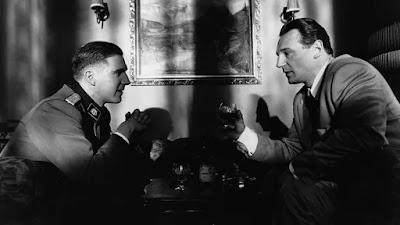Tuesday, 31 January 2023
The spy who came in from the cold: "Pathaan"
On demand: "Balloon"
Monday, 30 January 2023
How we used to live: "The Fabelmans"
Friday, 27 January 2023
For what it's worth...
My top five:
1. Decision to Leave
Thursday, 26 January 2023
The Nan movie: "All the Beauty and the Bloodshed"
Wednesday, 25 January 2023
Last gasp: "More Than Ever"
Tuesday, 24 January 2023
Money heist: "Thunivu"
Devil doll: "M3gan"
Friday, 20 January 2023
For what it's worth...
My top five:
1. Decision to Leave
On TV: "Captain Underpants: The First Epic Movie"
From the archive: "The Railway Man"
It’s possible Firth, like any good Englishman, felt a degree of guilt about the wild cheering that project garnered, because his latest The Railway Man serves almost as an apologia of sorts: a serious evocation of those traumas incurred once Georgie got his words out. Nothing much appears to be wrong at first. Firth’s Eric Lomax, though slightly shambling in thick tortoiseshell glasses, is introduced using his expert timetabling knowledge to woo recent divorcee Nicole Kidman on a train heading through the Lake District in the early 1980s.
As Lomax points out Carnforth, scene of Brief Encounter’s stiff-lipped trysting, we may be expecting the film to turn into a genteel late-life romance – but the apparition of a Japanese POW camp officer in the couple’s honeymoon suite hints that all really isn’t well within the Lomax psyche. At this point Jonathan Teplitzky’s film, adapted by Frank Cottrell Boyce and Andy Patterson from the real Eric Lomax’s memoir, reveals its hand as a case study: both a diagnosis of a troubled mindset, and an attempt to becalm it.
Flashbacks detail the experiences of the younger Lomax (Jeremy Irvine) in a labour camp shortly after the fall of Singapore; there, he was involved in the brutal, back-breaking work of laying railway lines through the jungle. Thereafter, the film’s inquiries proceed on two tracks, wondering what happened to Lomax in solitary confinement to leave his middle-aged self in such an agonised, petrified state, and then what this older Lomax will do with the knowledge one of his captors is still out there.
What’s impressive is how Teplitzky navigates multiple shifts in time, tone and genre to somehow – as its protagonist had to – arrive at a convincing point of closure. What starts as a fusty love story develops into a River Kwai-style internment drama, then – as the elder Lomax transforms into a one-man truth-and-reconciliation commission, with a knife in his back pocket – boils itself down to a single, probing conversation (not unlike the centrepiece of Steve McQueen’s Hunger) in which the fate of the narrative and of Eric Lomax’s sanity hinges on two men sitting either side of a table.
It isn’t just Firth who’s on good form here. Kidman, too, works wonders in a role that amounts to a handful of understandably concerned glances. Irvine, so ineffectual in Spielberg’s War Horse, really steps up as the young Lomax, withstanding the bulk of the film’s punishments while convincing as someone who might grow up to be Colin Firth; and the moving final act relies on the contribution of Hiroyuki Sanada (The Twilight Samurai) as Lomax’s opposite, working through similar traumas in his own dignified, understated manner.












